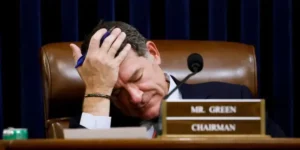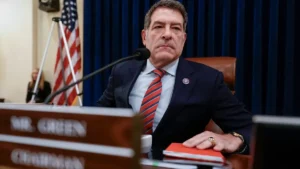Introduction
Within a single week, Republican chairs of three House committees have announced that they won’t seek reelection, raising questions about whether the GOP, riddled with chaos, is sidelining its top talent in Congress. What makes retirement particularly notable is that Republican lawmakers in the House faced no risk of losing their positions due to term limits set for their committee leaders. They could have potentially returned to leadership roles in the next Congress, but instead, they opted to leave the positions and the jobs they had worked hard to obtain for years.
Republican Strategist’s Critique
Republican strategist Doug Heye expressed that many lawmakers prefer being at home with their families rather than dealing with the challenges of an inactive Congress in Washington. He highlighted that Congress has become less effective over the years. Representatives McMorris Rodgers, Gallagher, and Green are not seeking reelection. McMorris Rodgers previously led the Energy and Commerce Committee, shaping policies on energy and commerce. This committee, alongside others, influences crucial areas like healthcare, with past lawmakers making notable contributions, such as expanding Medicare and enacting the Affordable Care Act.
Second Retirement in House Committees
The second retirement announcement came from the special committee focused on China, drawing attention to the new seat. Gallagher announced with “a heavy heart” that he wouldn’t run again. Gallagher’s announcement came as he voted against a censure of Homeland Security Secretary Alejandro Mayorkas, leaving the GOP’s right flank disappointed and creating a potential primary challenge. But Gallagher told a local Fox affiliate in Wisconsin that he and his wife had been considering leaving Congress long before the allegations. He also said there was nothing in particular he faced in the primary that he hadn’t faced when he declined to challenge the Electoral College tally in 2021.
This development further underscores the challenges and dynamics within the various house committees, with the special committee focused on China being a notable player in this context.
Rep. Green Announces Retirement

On Wednesday, Representative Green revealed that he won’t be seeking reelection. He’s currently serving his second term as the head of the Homeland Security Committee. The move came a day after he led the vote to censure Mayorkas over the accusations. He said he wanted to tell the story of his retirement as a subplot that had been leaked to the press. Green came close to accepting that the chaos of the past 14 months had played a role in his decision-making.
“Okay, there might be a slight correlation with the chaos of the job,” Green said. He said Republicans would have to increase their majority in the House to do anything.”So I’m going to pursue another path,” Green stated.
This announcement from Rep. Green adds another layer of complexity to the landscape of House committees, particularly the Homeland Security Committee, highlighting the challenges and pressures faced by its members.
McMorris Rodgers’ Committee Tenure
Cathy McMorris Rodgers reflected on her time leading the Energy and Commerce Committee as the most fulfilling aspect of her ten terms in Congress. She attributed her decision to various factors, with family being a primary consideration. Acknowledging the difficulty of her choice, she expressed pride in her accomplishments while recognizing the need for change. Ultimately, she felt it was the right moment to step away and prioritize other aspects of her life, signaling a significant development within the house committees.
Gallagher’s Term Limit
Gallagher expressed that he felt it was the right moment for him to step down. He highlighted the original intention for individuals from farming backgrounds to serve in Congress briefly before returning to their private lives. Emphasizing those electoral politics were never meant to become lifelong careers, he stressed that there should be no place for longstanding incumbents in Congress, including those in various house committees. With a sense of regret, Gallagher announced his decision not to seek reelection, contributing to the ongoing discussions about the role and tenure of members within the house committees.
Lucas Concerns Over Minority Status
Representative Frank Lucas, R-Okla., said he feared that there’s a possibility of being fired if the House loses in the November elections, and Republicans could provide services in the minority next year. “Who wants to end their career here in the minority?” Lucas said. “Legislating is also difficult at the moment because of the issues within parties and the balanced nature of the House.” He also noted that lawmakers have not seen any adjustment in the cost of living. At $174,000 annually, they make the same salary they did 15 years ago.
He pointed out that many members are valued experts in their respective committees. Their expertise is recognized by those outside of Congress, who may seek to recruit them. This sheds light on the challenges faced by members of various House committees and the broader dynamics within Congress.
Lucas Committed to the Committee

Lucas, who heads the House Science, Space, and Technology Committee, said he’s not considering leaving his position anytime soon. He recalled being advised during tough times by former Alaska Republican Don Young, who was the longest-serving Republican member in the House until he died in 2022. “He looks me in the eye and says ‘Lucas, you and I were here when this place was working. We can’t leave before coming back, some of these underclassmen don’t realize how things are going to be, what to do,” Lucas said, emphasizing the importance of experience and continuity within the house committees, especially in challenging times.
Buchanan Embraces Turnover
Representative Vern Buchanan, R-Fla., took a different stance and said that turnover is a good thing for the House. “It’s clear if you have a gall and you’re saying you’re leaving, and your term is not limited, I think it speaks to where their chamber is at,” Buchanan said. “And it’s unfortunate, but we’re right there,” he added, highlighting the varying perspectives on turnover within the house committees. House Democratic Caucus Chair Pete Aguilar called McMorris Rodgers and Gallagher “serious legislators who want to make things right,” underscoring the significance of their roles within the house committees.
“It’s very clear if you have a gall and you’re saying you’re leaving, and your term is not limited, I think it speaks to where their chamber is at,” Aguilar said.
Lawmakers’ Transition Plans
At the end of this session, 44 lawmakers are retiring or aspiring for higher positions, among which 23 are Democrats and 21 are Republicans. Republican Party Chairperson Richard Hudson stated that departing GOP members are securing Republican-held seats, but some Democratic retirements could “flip the script” for us.
“I’m not concerned about it,” Hudson said. Republican strategist Heywood mentioned that the retirements of McMorris Rodgers, Green, and Gallagher don’t usually matter in the grand scheme of things. “It’s a broken Congress’ current dynamics, which is unfortunate; it can’t do the good, regular work it should,” Heywood stated. He also expressed doubt that they’ll regret leaving. “You talk to any former member who has some income, they’re all happy now,” Heywood said. “They’re all looking at greener pastures,” highlighting the broader challenges faced by members within the house committees and the overall functioning of Congress.
Conclusion
In summary, the recent retirements of three prominent Republican committee chairs highlight challenges within the US House and its various committees. McMorris Rodgers, Green, and Gallagher’s departures reveal complex dynamics influenced by factors like family considerations and dissatisfaction with congressional functionality. These retirements raise questions about the effectiveness of House committees. They also affect the balance of power in today’s politics. Increased turnover in the House prompts scrutiny. People want to know its impact on legislative processes and governance.
FAQs
- Why are three Republican committee chairs retiring from the US House?
Answer: McMorris Rodgers, Green, and Gallagher are stepping down. They cite reasons such as family considerations. They also mention dissatisfaction with the House committees’ functionality.
- What effect on the House’s power dynamics would these retirements have?
Answer: The departure of these committee chairs raises concerns. People worry about a potential shift in the balance of power within the US House. They also worry about its various committees.
- How do family considerations play a role in the decision to retire from House committees?
Answer: Family considerations are cited as a primary factor influencing the decisions of McMorris Rodgers, Green, and Gallagher to step away from their roles within the House committees.
- What are the broader implications for legislative processes amid increased turnover in the House?
Answer: Retirements contribute to ongoing scrutiny regarding the long-term effectiveness of House committees and their ability to navigate the current political landscape.
- How are these retirements reflecting the current dynamics of the US Congress?
Answer: The retirements of key committee chairs shed light on the challenges and complexities faced by the US House, emphasizing the need for a closer examination of the functionality of its various house committees.
More info: Biden’s Political Strategy